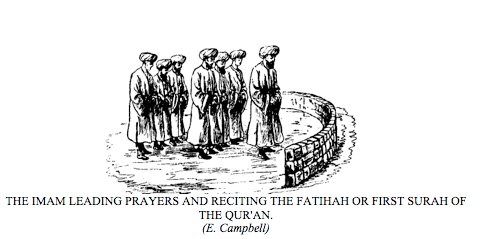One whose leadership or example is to be followed. A pattern; a model; and example of evil. The term is used in the Qur’an in these senses.
Surah ii. 118: “Verily I have set thee (Abraham) as an Imam (or a leader) for mankind.”
Surah xvii. 73: “The day when we will call al men by their Imam (or leader).”
Surah xxxvi. 11: “Everything we have set down in a clear model.”
Surah xv. 79: “They (Sodom and Midian) are an obvious example.”
Surah xxv. 74: “Make us a model to the pious.”
Muslims use the term in the following senses: –
(1) The Imam, or Khalifah, of the Muslim people. The author of the Hidayah says, by the rightful Imam is understood a person in who all the qualities essential to magistracy are united, such as Islamism, freedom, sanity of intellect, and maturity of age, and who has been elected into his office by any tribe of Muslims, with their general consent; whose view and intention is the advancement of the true religion, and the strengthening of the Muslims, and under whom the Muslims enjoy security in person and property; one who levies title and tribute according to the law; who, out of the public treasury, pays what is due to learned men preachers, qazis, muftis, philosophers, public teachers, and so forth; and who is just in all his dealing with Muslims; for whoever does not answer this description is not the right Imam, whence it is not incumbent to support such a one, but rather it is incum-

bent to oppose him, and make was upon him until such time as he either adopt a proper mode of conduct, or be slain; as is written in the Ma’dinu ‘l-Haqa’iq, copied from the Fawa’id. (Hidayah, col. ii. p. 248.)
For a discussion of this meaning of the title, refer to the article on KHALIFAH, which is the term used for the Imam of the Sunni Muslims.
(2) The Shi’ahs apply the term Imam to the twelve leaders of their sect whom they call the true Imams [SHI’AH], and not using the term Khalifah for this office as the Sunnis do. The Shi’ah traditions are very wild on the subject of the Imamate, and contrast unfavorably with those of the Sunnis.
In the Hayatu ‘l-Qulub (Merrick’s edition, p. 208), Muhammad is said to have related: “On the night of the ascension, the Most High commanded me to inquire of the past prophets for what reason they were exalted to that rank, and they all testified, We were raised up on account of you prophetical office, and the Imamate of ‘Ali ibn Abi Talib, and of the Imams of your posterity. A divine voice then commanded, ‘Look on the right side of the empyrean,’ I looked and saw the similitude of ‘Ali and al-Hasan, and al-Husain, and ‘Ali ibn al-Husain (alias Zainu ‘l-Abidin), and Muhammad al-Baqir, and Ja’far as-Sadiq, and Musa al-Kazim, and ‘Ali ibn Musa ar-Rize, and Muhammad at-Jaqi, and ‘Ali an-Naqi, and al-Hasan al-‘Askari, and al-Mahdi, all performing prayers in a sea of light. These, said the Most High, are my proofs, vicegerents, and friends, and the last of them will take vengeance on my enemies.”
(3) The Imam, or leader, of any system of theology or law. Abu Hanifah and the other three doctors of the Sunnis are called Imams, and so are other leading doctors of divinity.
The term is still used for a religious leader. For example, the head of the Wahhabis on the North-West frontier of India is called the Umam and so is the chief of Najd.
(4) The Imam or leader of prayers in any Masjid. Mr. Sale says it answers to the Latin Antistes. Each mosque, however, small, has its Imam, or priest, who is supported by endowments. The office is not in any sense a sacerdotal one, the Imam, not being set apart with any ceremony, as in the case of a Christian presbyter, nor the office being hereditary, as in the case of the Hindu Brahmins. The position of the Imam in this sense is not unlike the sheliach, or legatus of the Jewish synagogue, who acted as the delegate of the congregation, and was the chief reader of prayers, in their name. But quite independent of the duly appointed minister of a mosque, who is responsible for its service, and receives its revenues, no congregation of Muslim worshipers can assemble without one of the party taking the lead in the prayers by standing in front, and who is said “to act as Imam” for the assembly.
The rules laid down on this subject, as given in the Traditions, are as follows (Mishkat, book iv. ch. xxvii., xxviii):-
Abu Sa’id al-Khudri says the Prophet said: ‘When there are three persons, one of them must act as Imam and the other two follow him, and the most worthy of them to act as such is he who repeats the Qur’an best.”
Abu Ma’sud al-Ansari says the Prophet said” “Let him act as Imam to a congregation who knows the Qur’an thoroughly; and if all present should be equal in that respect, then let him perform who is best informed in the rules of prayer; and if they are equal in this respect also, let him act as Imam who has fled for the sake of Islam, and if equal in this likewise, let that person act who is oldest; but the governed must not act as Imam to the governor.”
Abu Harauah relates that the Prophet said: “When any of you acts as Imam to others, he must be concise in his prayers because there are decrepit, aged, and sick persons amongst them, and when any one of you says his prayers alone, he may be as prolix as he pleases. [MASJID.]
Based on Hughes, Dictionary of Islam

 © 2026 All Rights Reserved
© 2026 All Rights Reserved